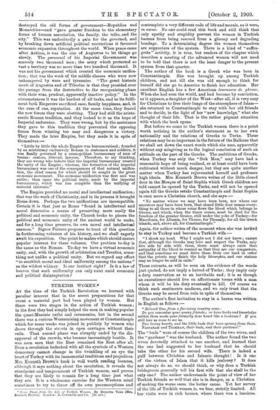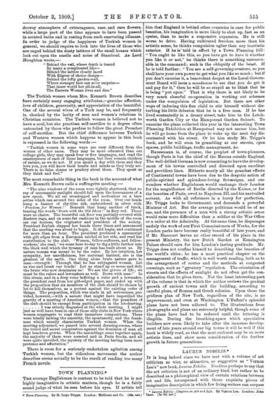Tl7RKISH. WOMEN.* AT the time of the Turkish Revolution we
learned with peculiar interest that in the secret preparations for that event a material part had been played by women. But there were two stages in the action of Turkish women ; in the first they had simply helped the men in making popular the quasi-Masonic oaths and ceremonies, but in the second there was a curious Westernising movement at Constantinople which for some weeks was joined in publicly by women who drove through the strcets in open carriages without their veils. That second phase was abruptly ended by the dis- approval of the crowds, who became increasingly hostile. It was soon seen that the East remained the East after all. Even a revolution bedecked with all the symbols of a Western democracy cannot change in the twinkling of an eye the heart of Turkey with its immemorial traditions and prejudices.
Mrs. Kenneth Brown's book is well worth reading because,
although it says nothing about the revolution, it reveals the standpoint and temperament of Turkish women, and proves that they are likely to remain for a long time just what they are. It is a wholesome exercise for the Western mind sometimes to try to throw off its own preconceptions and
• Some Pages from the Life of Turkish Women. By Demetra 'Yaks (Mrs. Kenneth Brown). London: A. Constable and Co. [5m net.] contemplate a very different code of life and morals, as it were, in mew. No one could read this book and still think that only apathy and stupidity prevent the women in Turkish harems from being rescued from a gloomy and degrading
bondage. To a determining degree the women themselves are supporters of the system. There is a kind of " suffra- gette " activity, it is true, but readers of the chapter which describes a meeting of the advanced women will not need to be told that there is not the least danger to the present system from that quarter.
The author of the book is a Greek who was born in Constantinople. She was brought up among Turkish children, and not till she was old enough to think for herself did she go to America to finish her education. Her excellent English has a few American immures de phrase. When she had seen the world, and had become by conviction,
as it appears, a daughter of the West—after all, it is very easy for Christians to free their lungs of the atmosphere of Islam— she returned to Constantinople to stay with her old friends and to decide, in the light of her "new knowledge," what she thought of their life. That is the rather piquant situation
with which the book opens.
But before we come to the Turkish women there is a point worth noticing in the author's statement as to her own nationality and the relations of Greeks to Turks. These relations may be so important in the future of the Balkans that we shall set down the exact words which she uses, apparently without any misgiving as to the logical conclusion of such an attitude on the part of the Greeks. The ambitions of Greeks, when Turkey was only the "Sick Man," may have had a reasonable hope of being realised, or at least could have been cultivated without much danger, but they are quite another matter when Turkey has rejuvenated herself and professes high ideals. Mrs. Kenneth Brown writes of the little closed door in the Mosque of Saint Sophia which Greek children are told cannot be opened by the Turks, and will not be opened again till the Greeks retake Constantinople and Saint Sophia is once more a Christian church, and she says :—
"No matter where we may have been born, nor where our ancestors may have been born, that closed little door means every- thing to all those in whose veins flows the blood which belongs to Greece, and which, when the times comes, must be shed for the freedom of the greater Greece, still under the yoke of Turkey—for Macedonia, for Albania, for Thrace, for Thessaly, for all the Greek islands, and, above all, for Constantinople."
Again, the author writes of the moment when she was invited to stay in Tm-key and become a Turkish wife :—
"I shook my head. Why I might not I did not know ; except that, although the Greeks may love and respect the Turks, may live side by side with them, there must always exist that antipathy of the blood to remind us that they are our conquerors, and that sometime we must drive them from our land in order that the priests may finish the holy Utourgliia, and our statues may no longer be cold in exile."
These extracts, as will be seen on the evidence of the words just quoted, do not imply a hatred of Turks ; they imply only a deep reservation as to an inevitable end ; it is as though
an executioner should live on affectionate terms with a man whom it will be his duty eventually to kill. Of course we think such sentiments madness, and. we only trust that the Greeks may be saved from ruin in spite of themselves.
The author's first invitation to stay in a harem was written in English as follows :—
"Beloved One, from a far-away country come : Do you remember your young friends ; or have books and knowledge within them made your formerly dear heart like a bookcase ? If you still love us come to see au.
Two loving hearts, and the little buds that have sprung from them. N AssAEAH and TSAMBAN, their buds, and their gardener."
The " buds " were of course the children of the two wives, and the " gardener " was the husband. The author found the two wives devotedly attached to one another, and learned that the one had suggested to her husband that he should take the other for his second wife. There is indeed a gulf between Christian and Islamic thought ! Is it one of the virtues of Islam that it kills jealousy ? It does not always do so, we should think, or why does a Turkish bridegroom generally tell his first wife that she shall be the only one? The author understands the point of view of her Turkish friends so well that she is in danger, as a Christian of making the worse seem the better cause. Yet her survey of the life of Turkish women is, we fear, strictly, limited. All her visits were in rich houses, where there was a luscious.
drowsy atmosphere of extravagance, ease, and rare flowers, while a large part of the time appears to have been passed in scented baths and in resting from such enervating idleness. In order to judge of the happiness of Turkish women in general, we should require to look into the lives of those who are caged behind the dusty lattices of the small houses which look out upon the smells and noise of Stamboul. As Lord Houghton wrote,—. - - " Behind the veil, where depth is traced
By many a complicated line—
Behind the lattice closely laced
With filigree of choice design—
Behind the lofty garden-wall,
Where stranger face can ne'er surprise—
That inner world her all-in-all, The Eastern Woman lives and dies."
The Turkish women whom Mrs. Kenneth Brown describes Lave certainly many engaging attributes,—genuine affection, love of children, generosity, and appreciation of the beautiful. One of the several wives of a Turk may be, and frequently is, shocked by the laxity of men and women's relations in Christian countries. The Turkish woman is believed not to have a soul, but she practises self-sacrifice to a degree often untouched by those who profess to follow the great Preacher of self-sacrifice. But the chief difference between Turkish and Western women which happens to appear in this book is expressed in the following words :--
" Turkish women in some ways are very different from the women of other races. They may be more educated than our college girls, they may speak four or five languages, and read the masterpieces of each of these languages, but they remain children of nature, as we do not. If you spend a day with them and they love you, you will know their hearts and minds as they truly are. There is no false shame or prudery about them. They speak as they think and feel."
The most remarkable thing in the book is the account of what Mrs. Kenneth Brown calls a suffragette meeting :—
"The nine windows of the room were tightly shuttered, that no ray of unromantic sunlight should fall upon the forerunners of a new epoch. We all sat crosslegged and motionless on a bare settee which ran around two sides of the room. Over our heads hung a banner of sky-blue silk, embroidered in silver with Freedom for Women ! ' Beneath that hung another of black, bearing the words 'Down with the Old Ideas ! ' in fiery red. There were no chairs. The beautiful oak floor was partially covered with Eastern rugs, and on some fat cushions in the middle of the room sat our hostess; the originator and president of the society. President Zeybah clapped her hands three times and announced that the meeting was about to begin. It did begin, and continued for more than an hour. The president produced a manuscript with gilt edges from a European satchel at her side, and read her contribution to the club.Women fellow-sufferers, and fellow. workers,' she read, we come here to-day to dig a little farther into the thick wall which the tyranny of man has built about us. By nature woman was meant to be the ruler. By her intuition, her sympathy, her unselfishness, her maternal instinct, she is the greatest of the earth. One thing alone brute nature gave to man—strength ! Through that he has subjugated woman. Let us rise and break our bonds ! Let us stand up en mane and defy the brute who now dominates us ! We are the givers of life ; we must be the rulers and lawmakers as well. Down with man !' In this strain, and in a deep voice befitting a ruler and a lawmaker, the president read from her gilt-edged paper, and ended up with the proposition that six members of the club should be chosen by lot to kill themselves, as a protest against the existing order of
. The proposition, which was made in all seriousness, pro- however,—with a naivete that might have imperilled the gravity of a meeting of American women,—that the president of the club should be exempt from participation in the lot-drawing. I was utterly disgusted at the whole meeting. I might just as well have been in one of those silly clubs in New York where -women congregate to read their immature compositions. There were totally lacking the sincerity, the spontaneity, and the frank- ness which usually characterize Turkish women. When the meeting adjourned, we passed into several dressing-rooms, where the veiled and secret conspirators against the dominion of man all kept luncheon gowns. When the assemblage came together again, -the majority of them were corseted and in Paris frocks, and all were quite unveiled, the mystery of the meeting having been mere pretence and affectation."
There is room for a seriously undertaken agitation among Turkish women, but the ridiculous movement the author describes seems actually to be the result of reading too many French novels.
'd



























































 Previous page
Previous page